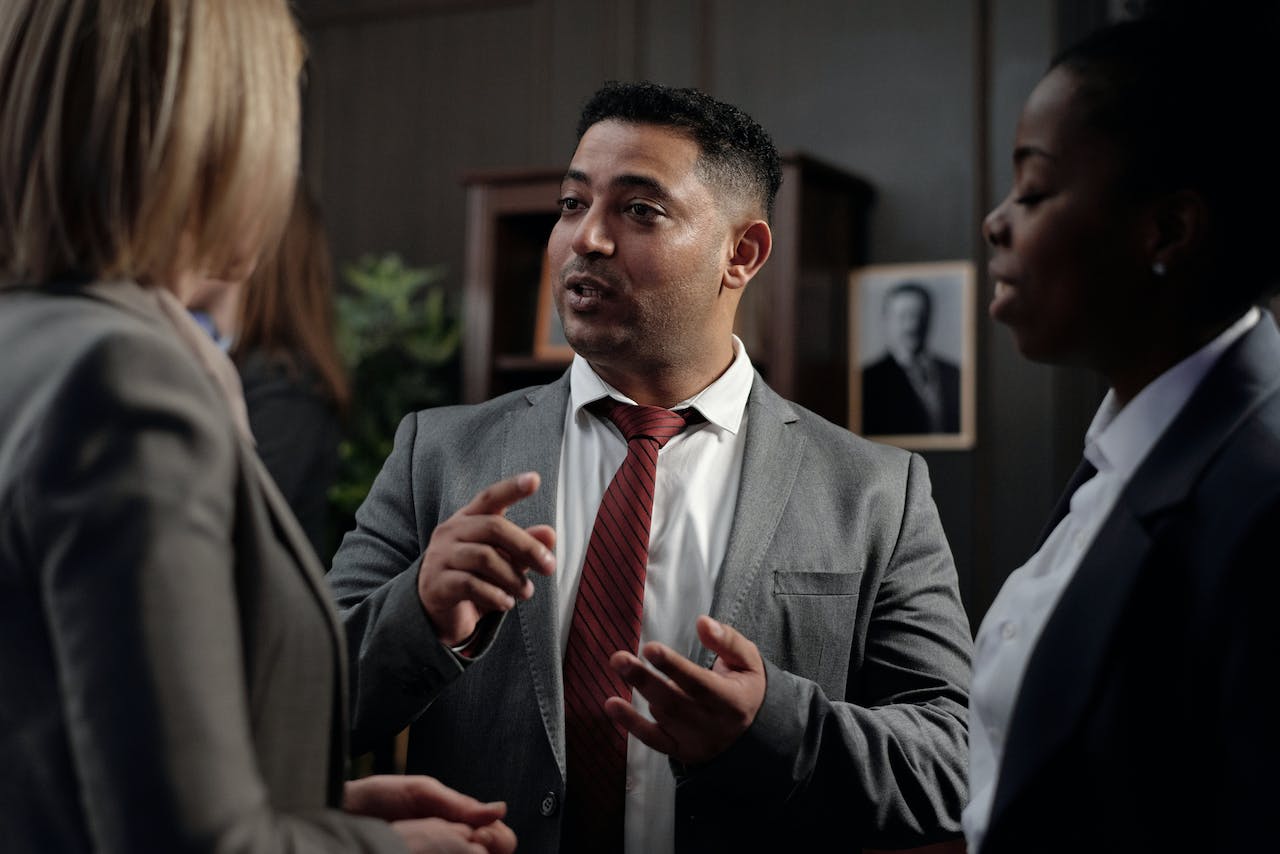Navigating the legal system can be daunting when faced with a personal injury case, which is why finding an experienced and compassionate lawyer to assist you is essential. It’s here that understanding how to find the best personal injury lawyer becomes essential. The right attorney doesn’t just bring legal expertise but also empathy and personalized attention to your situation.
A top-notch personal injury lawyer is someone who has significant experience with cases like yours, understands insurance companies’ tactics, and won’t hesitate to take your case to trial if necessary. But finding such an expert requires knowing what factors matter most in this search.
This piece will give you actionable insights on everything from understanding why hiring a professional for handling your claim is crucial, assessing potential lawyers based on their track record and fees structure, through asking them insightful questions during face-to-face meetings.
Table of Contents:
- Understanding Personal Injury Law and the Importance of Hiring a Personal Injury Lawyer
- Factors to Consider When Choosing a Personal Injury Lawyer
- Finding Potential Personal Injury Lawyers
- Evaluating Personal Injury Lawyers
- Meeting with Personal Injury Lawyers
- Questions to Ask Potential Personal Injury Lawyers
- Making a Decision and Hiring a Personal Injury Lawyer
- FAQs in Relation to How to Find the Best Personal Injury Lawyer
- Conclusion
Understanding Personal Injury Law and the Importance of Hiring a Personal Injury Lawyer
Personal injury law, often referred to as tort law, allows an injured person to seek compensation when someone else’s negligent or intentional act caused harm. Whether it’s an accident or personal harm situation, understanding these laws can be complex because they vary from state to state.
Injury cases range from car accidents to product liability lawsuits and typically involve questions like: who is at fault? Did negligence play a part in this injury? How much should be paid for medical bills, lost wages, pain and suffering?
The Role of a Personal Injury Lawyer
A personal injury lawyer serves as your advocate in dealing with insurance companies. These legal professionals are experts in negotiating settlements and getting you the compensation you deserve while keeping your best interests at heart.
An experienced personal injury attorney will know how different elements such as income loss due to inability work factor into settlement negotiations. They also understand that settling too soon might leave future related costs uncovered which is why hiring one early on helps ensure maximum recovery after an accident.
Why Hire a Personal Injury Lawyer?
Hiring professional help becomes crucial when dealing with insurance companies who have their own lawyers aimed at minimizing payouts. A good fit would be someone knowledgeable about specific regulations within your jurisdiction along with expertise handling similar claims before; thus helping navigate through what can otherwise seem like daunting paperwork involved during filing process all way till its resolution.
The State Bar Associations offer resources that let individuals verify if potential attorneys practice law legally alongside checking their reputation amongst peers thereby making decision easier about whom hire based off those parameters rather than just going by someone else’s recommendation alone.
Finally remember – personal injury lawyers work on a contingency fee basis, which means they only get paid if you win your case. So, it’s advantageous for them to make sure you succeed in your case.
Understanding personal injury law is complex, but a skilled lawyer can help navigate these tricky waters. They advocate for you against insurance companies and are experts in negotiating settlements to ensure maximum recovery. When choosing your lawyer, look at their knowledge of local regulations and past experience with similar claims. Remember they work on contingency – they only get paid if you win.
Factors to Consider When Choosing a Personal Injury Lawyer
Identifying an appropriate personal injury lawyer for your individual requirements is critical. When selecting a personal injury lawyer, it is important to consider certain key elements.
Experience and Specialization
The first factor that comes to mind is the attorney’s experience, particularly in handling cases similar to yours. An experienced personal injury lawyer, who specializes in your type of claim can be instrumental in securing favorable outcomes.
This kind of expertise allows them not only to navigate complex legal procedures with ease but also anticipate potential pitfalls. You wouldn’t want a generalist taking care of your case; specificity matters here because every claim has unique aspects requiring specialized knowledge.
Success Rate
Apart from their experience and specialization, another critical aspect is an attorney’s success rate. This doesn’t just refer to winning cases – it means obtaining substantial settlements or verdicts for clients as well.
A track record boasting high success rates demonstrates that they have proven strategies and techniques at their disposal. They’ve been there before, fought these battles, and come out victorious – so they’re equipped with practical wisdom derived from firsthand encounters on the battlefield known as litigation.
Note: To check if these attorneys match up against our recommended standards use resources like state bar associations where you can access lawyers’ backgrounds including any disciplinary actions taken against them.
Remember: It’s not about finding a good lawyer; it’s about finding the best attorney suited for YOU. Your relationship with your attorney should feel comfortable – like wearing an old shoe (not stinky though.). If something feels off during initial consultations trust those instincts.
It might seem overwhelming initially but remember: each step gets you closer to the justice you deserve. Stay focused, keep pushing forward and don’t settle for anything less than a good fit.
Choosing the right personal injury lawyer is crucial, and this choice should hinge on their experience in similar cases, specialization, and success rate. Remember to use resources like state bar associations for background checks. The goal isn’t just finding a good lawyer; it’s about finding the perfect fit for YOU.
Finding Potential Personal Injury Lawyers
When confronted with a personal injury claim, the challenge of discovering an accomplished personal injury attorney may appear overwhelming. But it doesn’t have to be. Finding a personal injury lawyer can be made easier by beginning the search with referrals from people who have had successful experiences.
The first method for identifying potential lawyers is through referrals from friends or family members who’ve had positive experiences with personal injury cases. Their firsthand accounts give valuable insights into a lawyer’s style, their ability to handle personal income loss claims, medical bills issues, and insurance companies disputes effectively.
You could also use professional resources like State Bar Associations. They often maintain comprehensive lists of certified attorneys in various areas of practice law including those who specialize in handling personal injuries.
Online Platforms and Legal Directories
Digital platforms provide another avenue for locating good fit lawyers for your case. Many legal directories list numerous law firms alongside reviews from previous clients that help paint a picture about each firm’s reputation and credibility within the industry.
Also consider using online forums dedicated to discussing legal matters; they might contain threads on recommended lawyers commonly refer cases involving specific types of injuries such as car accidents or workplace mishaps.
Avoiding Pitfalls When Searching Online
Beware though – not every promising-looking lawyer or law firm found online lives up to their hype. Always take time evaluating any potential attorney by looking beyond just impressive websites or eloquent profiles on social media platforms.
While there are many ways to find an experienced personal injury attorney capable enough to represent you effectively against formidable opponents like big insurance companies; ultimately what really counts most isn’t necessarily where you find them but rather whether they’re indeed right choice given specifics surrounding your case.
So, as you venture out to find the best personal injury lawyer for your needs, keep these methods and tips in mind. Finding a lawyer isn’t just about credentials – it’s essential to establish trust and faith in their commitment to your cause.
When it comes to finding a stellar personal injury lawyer, don’t fret – you have plenty of options. Start with referrals from your circle of friends or family. Professional resources such as State Bar Associations can also lend a hand. Don’t forget about online platforms, but tread carefully; not all lawyers measure up to their digital persona. Above everything else though, remember this: It’s all about having trust and confidence in the attorney you choose.
Evaluating Personal Injury Lawyers
Given the potential impact of your selection, it is essential to carefully assess any prospective personal injury lawyers before making a decision. Therefore, it’s crucial to evaluate potential lawyers thoroughly before making your choice.
Assessing Legal Fees
An experienced trial attorney might come with high legal fees. Despite the potential high legal fees, do not be dissuaded; instead, view it as an investment in a valuable service. Remember that most personal injury attorneys work on a contingency fee basis – meaning they only get paid if they win or settle your case.
Apart from understanding the costs involved in hiring a particular attorney, make sure to ask about any additional expenses like court filing fees or expert witness charges that may be incurred during the course of your lawsuit.
Seeking a Fair Settlement
The primary role of an attorney in negotiating for fair settlement revolves around understanding and advocating for what you deserve based on factors such as medical bills, income loss due to inability to work and even pain and suffering caused by the accident.
To achieve this objective, lawyers commonly refer cases amongst each other based on specific expertise needed. This practice helps ensure optimal outcomes since more experienced personal injury lawyers are better equipped at handling insurance companies who often attempt low-ball settlements.
Note: You need not accept anyone else’s recommendation blindly but use them as one data point among many others while evaluating potential candidates.
Remember when bringing copies of relevant documents such as police reports for initial consultations can give prospective lawyers comprehensive insights into your claim enabling them to offer free advice tailored specifically towards winning compensation appropriate for all damages suffered.
Take time finding good fit lawyer personally right type injury victim will thank yourself later successful resolution claim.
It’s key to choose the right personal injury lawyer for your case. Don’t let hefty legal fees scare you off, many lawyers operate on a contingency basis, meaning they only get paid if they secure a win or settlement. Always ask about any hidden charges such as court filing costs or expenses related to expert witnesses. A top-notch attorney recognizes the importance of equitable settlements and might refer cases that need specialized knowledge for the best possible results.
Meeting with Personal Injury Lawyers
When seeking a good personal injury lawyer, meeting them in person is critical. At the meeting, you can evaluate the lawyer’s approach and decide if they are suitable for your claim.
The initial consultation typically involves discussing your claim and presenting any relevant documents like medical bills or police reports. At a consultation, your documents like medical bills or police reports can give the lawyer an understanding of your case and help them guide you on how to move forward.
You may be wondering what happens during these meetings. Well, experienced personal injury lawyers work by analyzing every aspect of your case, assessing possible strategies that could lead towards success in court or during settlement negotiations.
Ambulance Chasers – Not Your Best Bet
While some might suggest going for so-called ‘ambulance chasers’, this approach isn’t advisable. Such attorneys usually don’t offer free consultations but rather use aggressive marketing tactics without necessarily having the expertise needed for personal injury cases.
Detailed Settlement Negotiations Discussion
An important part of these meetings should involve detailed discussions about potential settlement negotiations with insurance companies. AllLaw.com suggests that a key quality of reputable law firms is their ability to advocate fiercely for their clients’ rights while negotiating settlements effectively.
Your Role During Meetings: Be Proactive.
In order not just to sit passively during such interactions, make sure you ask questions regarding income loss due to injuries sustained, contingency fees structure among other things. Remember that it’s crucial for you as an injury victim also understand how these aspects would affect overall compensation from successful claims.
Questions to Ask Potential Personal Injury Lawyers
Finding a good personal injury lawyer requires careful consideration. Here are some key queries you should pose to potential attorneys to make sure they’re a good choice for your situation.
Background and Experience
To start, get insights into the lawyer’s background and experience. The question of “How long have you been practicing law?” is essential as it can give an indication of their expertise in handling personal injury cases. You might also want to ask about their percentage of practice dedicated specifically to these types of cases; understanding this could be key in assessing whether they’re right for your situation.
You’ll need someone who knows how to navigate insurance companies’ tactics, so consider asking: “Have you worked with my insurance company before?” Their answer will help assess if they have the requisite knowledge about specific insurers’ processes which could prove beneficial during claim negotiations.
Fees and Expenses
The financial aspect is crucial when hiring any service, let alone legal ones that may charge hundreds or even thousands depending on the complexity of your case. So make sure you understand fully how much they would cost upfront by asking: “What’s your fee structure?” A common arrangement among personal injury attorneys is working on contingency fees – where payment depends upon winning the case – but do clarify this from the outset. More information on legal fee structures here.
An additional expense often overlooked involves out-of-pocket costs related to preparing for trial such as expert witness fees or court filing charges – so don’t forget about those. Asking something like “Do I need to cover other expenses apart from your fees?” can save surprises later down the line. Here’s a comprehensive guide to additional costs in personal injury cases here.
Remember, asking the right questions can be your first step towards finding an experienced personal injury lawyer who will work diligently on your case.
Finding the best personal injury lawyer demands careful questioning about their background, experience with your insurance company, and fee structure. Ask how long they’ve been practicing law and what percentage of their practice is dedicated to personal injury cases. Understand fully how much they’ll cost upfront, including potential out-of-pocket costs for trial preparation.
Making a Decision and Hiring a Personal Injury Lawyer
Deciding on the best personal injury attorney to manage your claim is a fundamental advance towards guaranteeing reasonable remuneration. This process needs meticulous evaluation, careful consideration of various factors such as experience, specialization, success rate in similar cases, and style of practice.
Evaluating Potential Lawyers
To get started with this process, create a shortlist from referrals or online searches. Evaluate their track record: how many personal injury cases have they handled? What’s their win ratio? A good fit would be one whose majority work revolves around handling personal injury claims.
Moreover, pay attention to how prospective lawyers communicate. An attorney’s communication skills can significantly impact negotiation outcomes with defendants’ counsel or even judges if your claim proceeds to trial.
Fee Structure Considerations
The legal fees structure should also play into your decision-making process since most personal injury attorneys operate on a contingency fee basis. In other words, a no win-no fee policy applies where they only charge upon successful settlement or verdict.
Scheduling Meetings With Prospective Attorneys
A meeting will let you assess compatibility further—do they listen attentively? Do they understand all aspects of your case fully?
You’ll need an advocate who comprehends every nuance related to liability issues surrounding injuries like yours as well as damage calculations involving medical bills and income loss due to consequent inability to work. Your potential lawyer must empathize with what happened but still remain objective enough to provide a clear-eyed assessment of your case.
Hiring Your Personal Injury Lawyer
Once you’ve evaluated all these factors and feel confident about one lawyer, it’s time to officially hire them. They’ll start by filing the personal injury lawsuit on your behalf. But remember, if they reject your case initially, don’t despair – always seek a second opinion. Here’s how you can do that.
might feel swamped, but don’t worry. Following the correct steps will make sure you get the justice you deserve as an injury victim.
Choosing the right personal injury lawyer is crucial for fair compensation. Start by creating a shortlist, evaluating their experience and success rate with similar cases. Pay attention to communication skills and fee structure – most operate on a no-win, no-fee basis. Schedule meetings to assess compatibility, understanding of your case specifics, and empathy balanced with objectivity. Once you feel confident in their ability to represent you effectively, it’s time to move forward with them as your legal advocate.
FAQs in Relation to How to Find the Best Personal Injury Lawyer
What percentage do most personal injury lawyers take?
Most personal injury lawyers work on a contingency fee basis, typically taking around 33.33% (or one-third) to 40% of the recovery amount.
What should you look for in a personal injury lawyer?
You want an experienced attorney with a solid track record in similar cases, transparent fees and expenses, good communication skills, and high ethical standards.
What are the 3 types of damages?
The three types of damages usually sought after in personal injury suits include compensatory (actual losses), punitive (to punish wrongdoing), and general damages (for pain and suffering).
How do I find a good lawyer near me?
To find quality local attorneys, try referrals from trusted folks or professional networks. Also check out online directories like your state’s Bar Association website or review sites.
Conclusion
Identifying a top-notch personal injury lawyer is not an uncomplicated mission, yet it’s essential to ensure you obtain the justice and recompense you merit. An experienced lawyer is essential for securing the justice and compensation you are entitled to.
Remember to consider their specialization and success rate when making your choice. Your lawyer’s past performance speaks volumes about their ability to handle your case effectively.
Take advantage of referrals from friends or bar associations, and don’t forget to assess potential lawyers through interviews and meetings. Use this opportunity not only for getting answers on fees structure but also for gauging if they are a good fit personally.
Now that you know how to find the best personal injury lawyer, use these insights wisely. Take charge of your situation with confidence!





